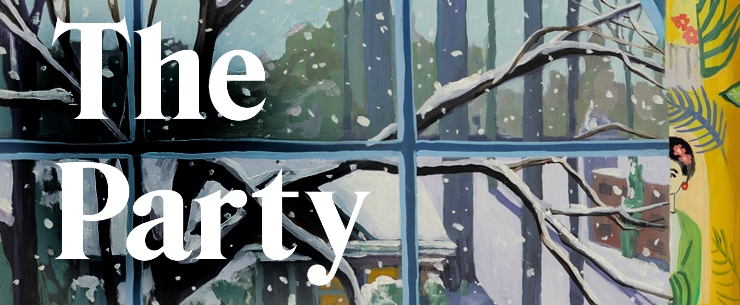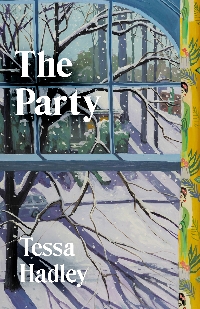Blog tour: The Party by Tessa Hadley

This post is part of a blog tour organised by Random Things Blog Tours. I received a free copy of the book in return for an honest review.
‘On a winter Saturday night in post-war Bristol, sisters Moira and Evelyn, on the cusp of adulthood, go to an art students’ party in a dockside pub; there they meet two men, Paul and Sinden, whose air of worldliness and sophistication both intrigues and repels them.
‘Sinden calls a few days later to invite them over to the grand suburban mansion Paul shares with his brother and sister, and Moira accepts despite Evelyn’s misgivings.
‘As the night unfolds in this unfamiliar, glamorous new setting, the sisters learn things about themselves and each other that shock them, and release them into a new phase of their lives.’

The Party, by Tessa Hadley, is a novella that focuses on two formative nights in the life of two sisters in early adulthood in late-1940s Bristol: a party in a run-down pub, and a get-together at a grand house that’s seen better days, at the invitation of an slimy man they meet at the former.
Art student Moira is the older of the pair, and has always come across as having a stronger, more confident personality. While admiring her sister’s sense of presence, adventure, and style, languages student Evelyn has long felt overshadowed and child-like in comparison. The events of the story, however, help them to better understand and relate to one another.
I really enjoyed The Party. The author packs a wealth of detail into just over 100 pages (and the print, in my review copy at least, is larger than average to boot!). It takes so much skill and discipline to write about just two events, and only include the most pertinent information about the characters, while also making them so compelling that the reader is left wanting more.
What especially stood out to me is how evocative this book is. Hadley’s vivid descriptions and attention to detail totally capture the essence of this particular moment in history, when one world was ending and another was beginning. It put me in mind of Elizabeth Jane Howard’s wonderful Cazalet Chronicles, but on a much, much smaller scale!
Evelyn travels past bombsites on her way to the Steam Packet, which is barely still standing itself; the pair’s parents have a terrible marriage but their mother refuses to divorce, ostensibly because she’s a Catholic, but also probably because it’s not the “done thing”; the mansion where the gathering takes place lacks the servants required for its upkeep, and its young inhabitants, unlike the studying sisters, seem ill-prepared for a world where they might actually have to work for a living.
The Party also really encapsulates the mixed feelings of the quiet, anxious girl just entering the adult world. I could very much relate to Evelyn’s excitement about going to the pub and her unlikely dream that she might magically transform into the life and soul of the party, as well as her contrary urge to return to the safety of home, and her reluctance to spend an evening at a strange house at the behest of a man neither she nor Moira (who twists her arm into going) actually likes.
At the same time, we (alongside Evelyn) learn that Moira is less self-assured than she seems. This got me thinking (as I often am *gestures towards PhD thesis*) about birth order, family circumstances, and sibling relationships. As the eldest child of a forlorn mother and often-absent father, the role of organising and jollying along the family (there’s also a very entertaining 12-year-old brother, Ned) seems to have fallen to Moira, whether she would have chosen it for herself or not.
As an only child and inveterate observer of siblings, it fascinated me to see Moira and Evelyn’s mature and sophisticated older sister/annoying and dorky younger sister relationship develop into one where they related to one another as equal adults, and actually chose to spend time in each other’s company. Of course, the events that precipitate this are the climax of the story, and I don’t imagine there’s such a clear, novella-warranting turning point in many sibling relationships!
I was additionally moved to consider how being even slightly different ages during the recently-concluded Second World War affected the how various characters related to one another.
Being perhaps two or three years older than Evelyn and eight or nine years older than Ned, Moira would probably have more memories of what life was like before the war, as well as more awareness of what was going on during it (possibly explaining why, when they hear a young person known to them has died, Evelyn gets quite upset, while Moira comes across as prematurely world-weary).
They might also have experienced the privations of war in different ways; for example, Moira might have found clothes rationing particularly inconvenient at an age when she was starting to pay attention to fashion, while her siblings may have been more put out by sweet rationing.
These age differentials particularly come to the fore at the grand house, though. Two of those in attendance – an invalid and a uniformed G.I. – can’t be much older than the others, but appear to be set apart from them by their war experiences, both in terms of their attitudes and how they’re treated.
Meanwhile, the siblings who own the house were never meant to inherit it, but ended up doing so because their aunt and uncle lost all their sons in the war. Despite the occupants’ offhand, superior manner and attempts at revelry, you can’t help but sense their bewilderment that their lives haven’t unfolded how they were supposed to, and that the gilded world they grew up in may be gone forever.
The Party ties a strong sense of time and place, and rich considerations of class, family relationships and growing up, into an impressively compact package.
